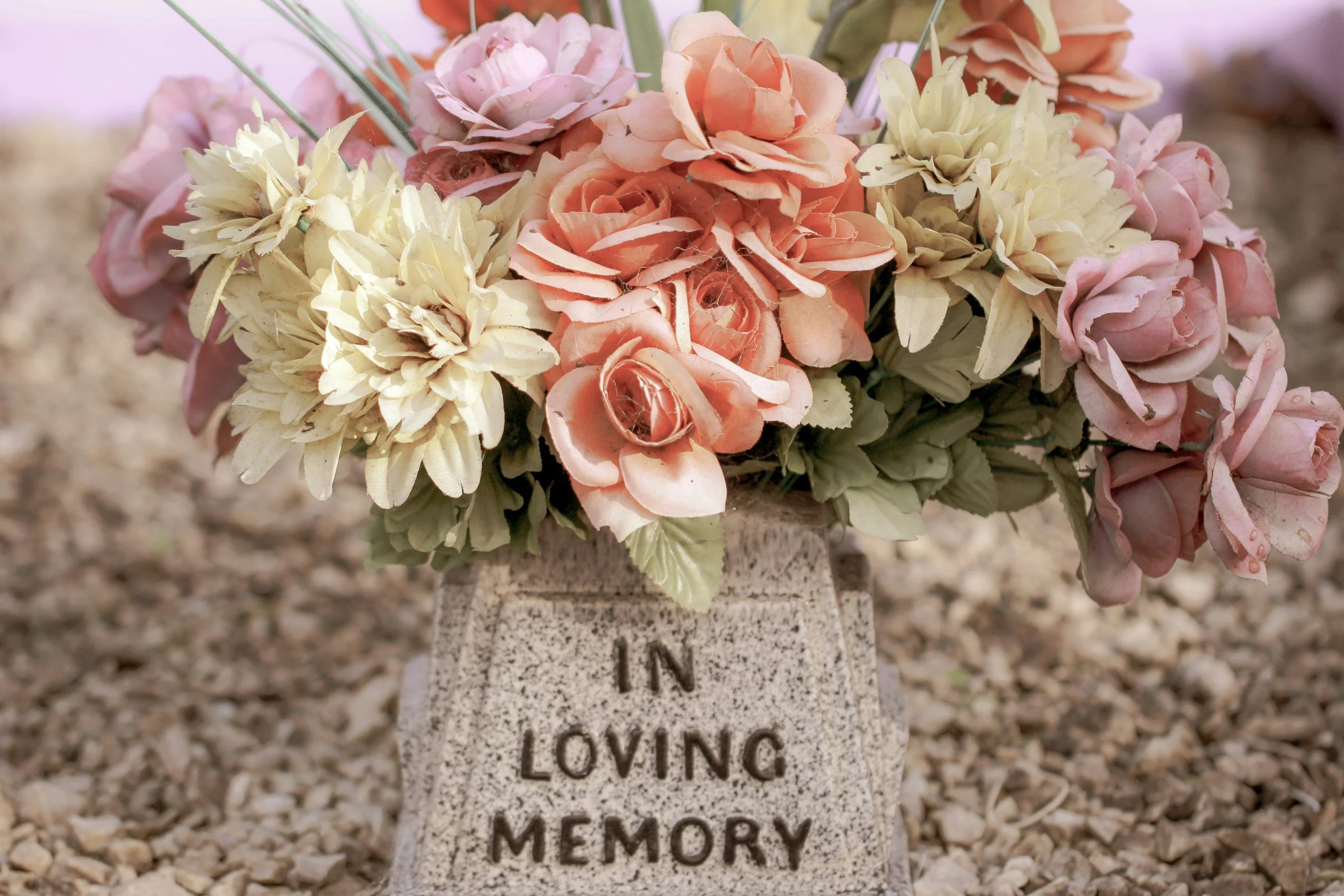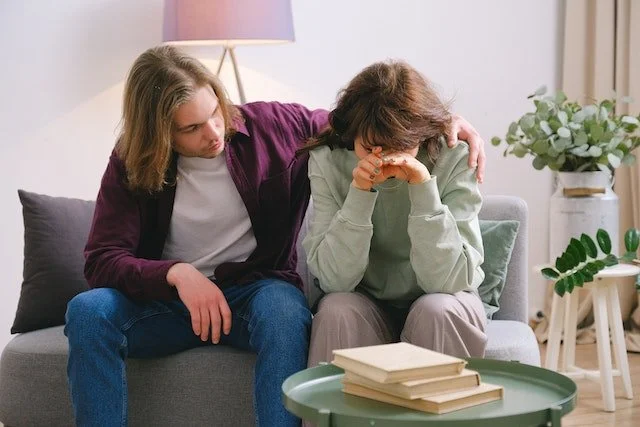Grief Counseling
Do You Feel Stuck In Place After A Difficult Loss?
Is overwhelming pain or disappointment making it hard to find the energy to keep going?
Do events and conversations you used to handle with relative ease now leave you too exhausted or overwhelmed to function?
Have loved ones told you that “it’s time to move on,” but you aren’t ready to let go yet?
Maybe you built your life around the person, pet, relationship, job, or home that you lost, and the sudden or unexpected change has left you feeling like you don’t know who you are anymore.
You may have turned to alcohol, drugs, anger, or rage in an effort to avoid or numb the pain, but that has only left you feeling more isolated with your thoughts.
Two women indoors on a couch holding hands with their heads down.
Does it seem like you’ve been grieving for months or years but still feel lost or depressed? Changes in your sleeping or eating habits might have left you sluggish and unproductive. Making things more difficult, you may experience distressing physical symptoms. And sometimes it can feel easier to just shut down than to deal with all of the pain and uncertainty. Perhaps you’ve tried getting back to your usual routine to distract yourself or to be strong for others; but no matter how busy you get, the pain of the loss remains.
Alternately, you may have felt a sense of relief following the loss as you tried to focus on the future. But now you feel guilty or ashamed for not feeling the way you think you are supposed to. You might believe that no one will understand how you feel, so you avoid talking about the issue.
Do you wish you knew what steps you could take to feel better and get back to “normal” life? Fortunately, with the support of a compassionate and understanding grief counselor, you can process your loss, work through difficult emotions, and find a way to navigate through the grief and move forward in your life.
Everyone Experiences Grief And Loss In Their Own Way
Grief is a normal and appropriate reaction to change and loss. Yet, many of us feel like we have to navigate the mourning process on our own. We believe we have to be strong and hide our pain from the world. At the same time, we worry about how we will be perceived if we don’t grieve in the “right” way or for the “right” things.
Whether you lost something tangible, like a loved one or relationship, or something intangible, like a sense of trust and safety, it’s natural to go through a period of uncertainty and self-doubt. Even changes that you are excited about, like overcoming addiction or accepting a new job in a new city, represent a major change that can be difficult to adapt to. And without the right support in place, grief can develop into feelings of anxiety and depression.
The truth is that grief is its own journey, and how you cope with loss will be different than how someone else does. Unfortunately, there are many myths surrounding grief that can make the process harder. Well-meaning loved ones may tell you “time heals all wounds,” leaving you feeling guilty or ashamed for not recovering by now. Or you might believe that the pain will fade if you just stay busy or strong enough, so any setbacks cause you to question yourself.
While everyone experiences loss at times in their lives, many of us weren’t taught how to navigate the grieving process on our own. So we Google “how to handle grief” and blame ourselves when the steps don’t work.
Thankfully, grief counseling can give you a clear path forward so you can process the loss in a healthy, productive way and get back to living your best life.
The back of three young boys and a girl with their arms around each other as they gaze off into a forest.
Find Relief And Healing With Grief Counseling
Therapy for grief and loss gives you a safe space where you can offload the pain you’re carrying without fear of being judged or criticized. You can see that your thoughts and emotions are a natural response to the loss, and even if you have been stuck in a difficult or lengthy grieving process you can still find balance. Whether we work together one-on-one or as a couple or family, my goal is to empower you with the clear steps, tools, and education you need to navigate the loss and regain a sense of control.
When you have a trained professional who accepts you as you are right now, you can see that you aren’t alone. To that end, our first session will be about getting to know each other. I’ll ask you questions about how the loss is affecting your life—the intensity, the frequency of symptoms, and how long you have been struggling—so I can tailor my treatment plan to your specific needs. We’ll also use this first session to address any questions you may have about my experience or modalities so you can feel comfortable and confident throughout our work together.
The connection we form will be a key part of the healing process, and we’ll always move at a pace that feels safe and comfortable for you. Before we start exploring the core of the issue, we’ll work together to understand and address any painful or distressing symptoms that are keeping you stuck. This patient, compassionate approach has helped many of my clients start to feel better after the first few sessions. But I want to do more than just help you find relief in the present moment: I want to equip you with proven tools to help you navigate this and any other losses you may experience in the future.
During our ongoing sessions, I’ll draw from two evidence-based models proven effective in helping people recover from loss. With the Trauma Resiliency Model, you can learn how to identify maladaptive coping skills—like staying in bed or turning to alcohol to numb the pain—that are preventing you from addressing the loss in a healthy way. I’ll help you understand the reasons those patterns formed, how to assess your needs when you feel overwhelmed, and what you can do to introduce more effective coping strategies. The Grief Recovery Method (GRM) builds on this idea by helping you recognize “unfinished business” surrounding the loss that may be prolonging the grieving process. By learning how to communicate your grief openly and honestly and without shame, you can enjoy positive memories while continuing to heal.
I have been helping individuals, couples, and families recover from loss since 2012. Through my own personal and professional experience as a grief therapist, I’ve seen that healing is always possible. No matter how difficult things may seem right now, you are capable of coming back into balance and living a life of joy again.
Ascending wooden stairs surrounded by wild flowers.
But you may still have questions or concerns about starting grief counseling…
I should be able to handle this on my own.
It’s a common myth that we should be able to move through the grieving process on our own. But the truth is that we’re all wired to be relational, and recovering from loss often requires outside support. When you are open to coming in and giving yourself permission to feel better, you can learn to manage and move on from the pain of your loss.
Can we work with you as a family?
Absolutely! Grief affects us all in unique ways, and recovering from loss isn’t only an individualized process. By attending bereavement counseling as a family, you can each share your experiences in a structured and safe environment so you can all identify concerns and work through your grief in a healthy, productive way.
I’m supposed to be over this already. Why am I still struggling?
Going through a prolonged grieving process can be a frustrating and lonely experience, especially if you have already tried talking to loved ones or accessing other resources. But many grief recovery tools focus on managing symptoms rather than getting to the root of the issue. With my help, you’ll also have the opportunity to really sit with and unpack the underlying factors that have left you feeling stuck so you can move beyond symptom management and find true, sustainable healing.
Let Us Help You Honor Your Past While Moving Forward
If you are ready to work through your grief in a healthy and productive way, we invite you to contact us to schedule a free initial phone consultation @ (480) 677-9913.
Relevant Blog Posts
Have Questions?











